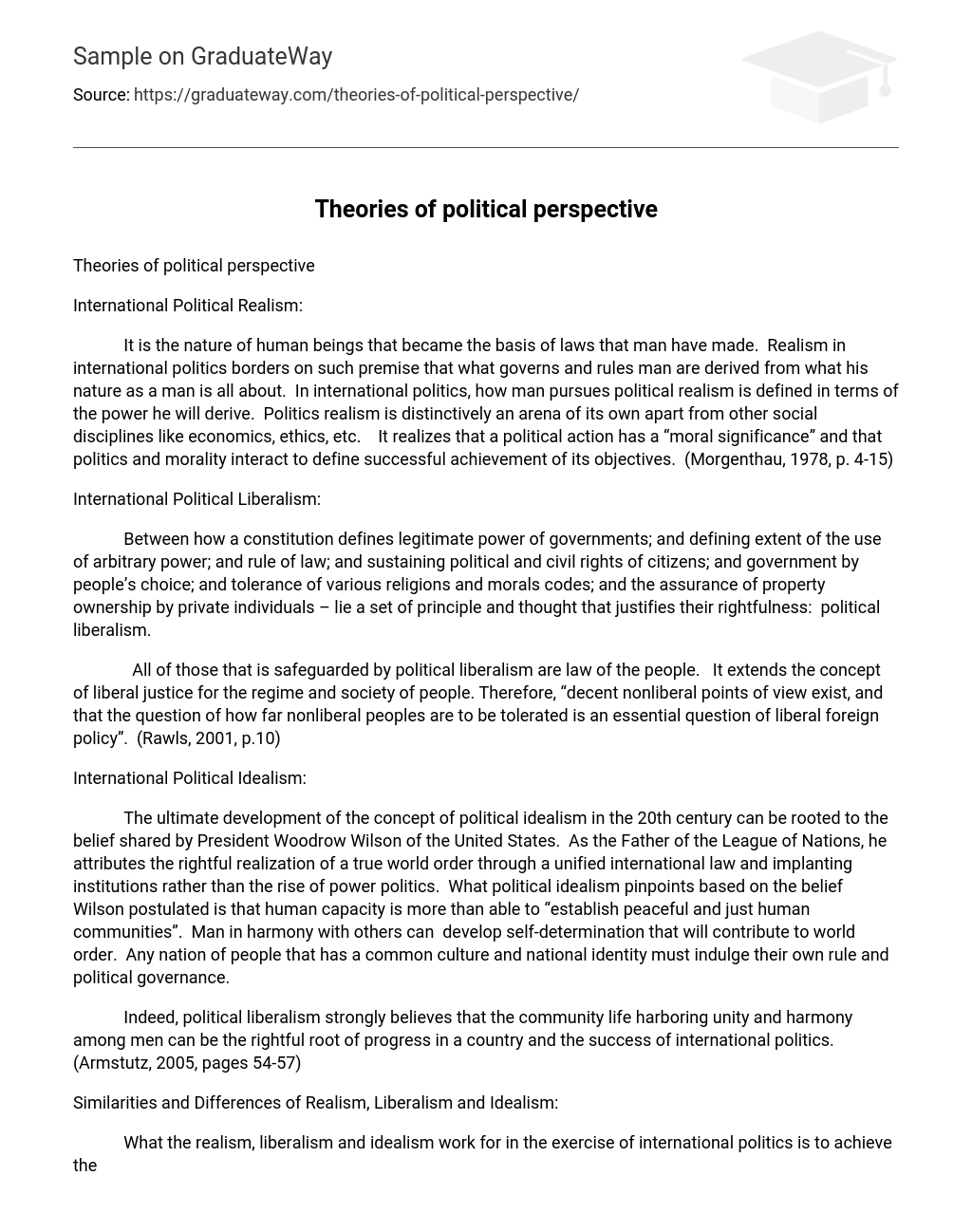It is the nature of human beings that became the basis of laws that man have made. Realism in international politics borders on such premise that what governs and rules man are derived from what his nature as a man is all about. In international politics, how man pursues political realism is defined in terms of the power he will derive. Politics realism is distinctively an arena of its own apart from other social disciplines like economics, ethics, etc. It realizes that a political action has a “moral significance” and that politics and morality interact to define successful achievement of its objectives.
Between how a constitution defines legitimate power of governments; and defining extent of the use of arbitrary power; and rule of law; and sustaining political and civil rights of citizens; and government by people’s choice; and tolerance of various religions and morals codes; and the assurance of property ownership by private individuals – lie a set of principle and thought that justifies their rightfulness: political liberalism.
All of those that is safeguarded by political liberalism are law of the people. It extends the concept of liberal justice for the regime and society of people. Therefore, “decent nonliberal points of view exist, and that the question of how far nonliberal peoples are to be tolerated is an essential question of liberal foreign policy”. (Rawls, 2001, p.10)
The ultimate development of the concept of political idealism in the 20th century can be rooted to the belief shared by President Woodrow Wilson of the United States. As the Father of the League of Nations, he attributes the rightful realization of a true world order through a unified international law and implanting institutions rather than the rise of power politics. What political idealism pinpoints based on the belief Wilson postulated is that human capacity is more than able to “establish peaceful and just human communities”. Man in harmony with others can develop self-determination that will contribute to world order. Any nation of people that has a common culture and national identity must indulge their own rule and political governance.
Indeed, political liberalism strongly believes that the community life harboring unity and harmony among men can be the rightful root of progress in a country and the success of international politics. (Armstutz, 2005, pages 54-57)
What the realism, liberalism and idealism work for in the exercise of international politics is to achieve the better venue in uniting peoples and government. These three perspective unanimously work towards gaining the better of advantage for the welfare of the people and at the same time to make sure that law and the governments keep to the fulfillment of their mandate in ensuring progress and development for their countries.
Of all the three perspective, political realism is the most profound. Yet, it is the least understood and most difficult to interpret. The intellectual and moral demands of political realism are the most challenging because the rigors that are involved in making lawmakers, administrators and the citizens themselves to become atuned to the unified interpretation of the principles of political realism are complicated.
The incessant drive of Adolf Hitler is the perpetuation of the Aryan race, which he considers as the “master race”. He campaigned that the fall of Germany during the First World War and the ensuing economic disarray of the country was due to the Jews.
Hitler arose from his incarceration and instituted strategies to begin for Germany a new economic and political stability in 1929. He allied himself with the Nationalist Alfred Hugenberg. Hitler charmed his way to businessmen and industrial magnates that he controls political funds, which he uses to fight a government that is “a strong right wing and anti-working class.”
Therefore the all the big industries and business in Germany was convinced and gave Hitler funding subsidies. These therefore placed the party of Hitler in a strong financial position. Hitler established strong appeal to the mass and utilized mass agitation to clamor for change in government leadership. Hitler was a master in exploiting existing weaknesses of the government to convince the masses to his way of thinking. He was “a shrewd and calculating politician”. Hitler is very insightful to weaknesses in others and of situation that he capitalizes on. He was a very effective and convincing orator. Therefore, when he finally earned his reward, he was made Chancellor in 1933 and established absolute dictatorship.
His style of governance made him delegate responsibilities to his subordinates to take care of the domestic affairs of the country. Departments and offices and organizations were created to look into the details of internal affairs of the Nazi State – and they all exercised absolute power within the jurisdiction of their responsibilities. However, Hitler made sure that they are not totally strong that might pose a challenge to his absolute authority.
Together with his political maneuverings among his subordinates and the composition of power in the Nazi Party, the economy of Germany recovered. Unemployment was reduced. It is within the realm of tyranny and absolute dictatorship that Hitler was amazingly able to charm the masses and the people of Germany to follow and obey his lead. (Minerbi, 2005, p.38-39)





